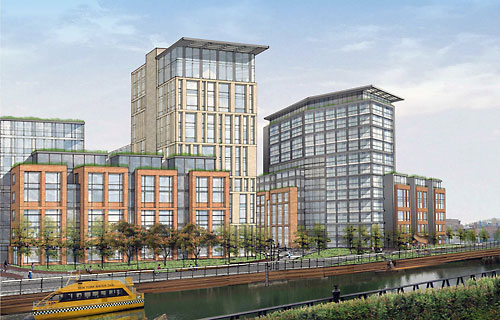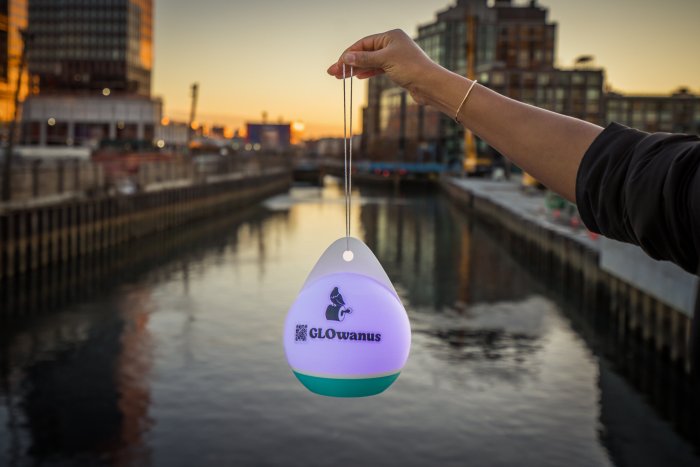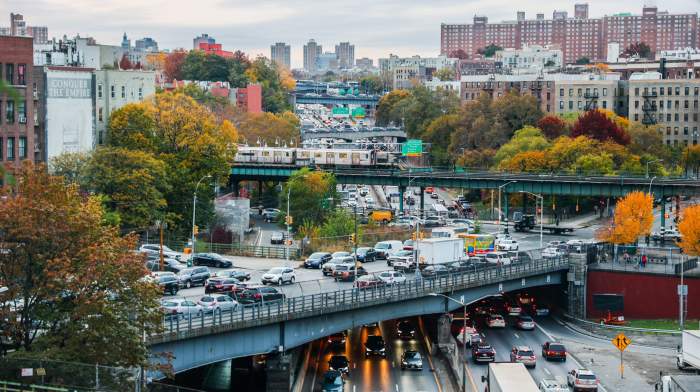The fetid Gowanus Canal is on track for a federal clean-up — but it could also flush the canal zone’s first major residential complex.
David Von Spreckelsen, a vice president of Toll Brothers, said his company’s proposed 575-unit canal-side project “wouldn’t make sense” if the federal government embarks on what would be a multi-year cleaning of the famed “Lavender Lake.”
On Wednesday, federal officials revealed that South Brooklyn’s famed corpse of water is poised to be named a Superfund site — a classification that would allow the Obama administration to tap into a pool of federal money set aside for toxic clean-ups nationwide.
But such cleansing still leaves a dirty mark, said Von Spreckelsen.
“The adjacent properties will have this stigma of being located on a Superfund site, and I don’t think any rational businessperson would invest money in a property that has that kind of stigma attached to it,” he said.
The developer also said his company could not afford to wait for the clean-up to be finished. Toll Brothers received Council approval for its project last month and was expected to break ground this year.
“Typically [a] Superfund [clean-up takes] about 15 years,” he said. “We probably don’t have that type of time horizon.”
He said the company does acknowledge that the canal requires environmental remediation, but considers the proposed Superfund designation as “an extreme measure.”
There is wide support for some kind of clean-up of the 1.8-mile long waterway, which is tainted with pesticides, coal tar, metals, and gonorrhea, among other contaminants.
Some Gowanus activists cheered the Superfund designation and suggested that if the Toll Brothers project is canceled, the site alongside the squalid canal be turned into wetlands in an effort to remediate contamination.
But other canal advocates feared that being added to the Superfund list — which currently includes 1,331 sites around the country — could delay other promised canal clean-ups, like the imminent repair of the Gowanus flushing tunnel and pump station, and installation of new screens on underground pipes.
“If the canal gets put on the Superfund list, we have to insure that in no way, shape, or form, the [classification] delays any step of the clean-up that has been proposed over the past few years,” said Bob Zuckerman, a canal activist who is also a candidate to succeed Councilman Bill DeBlasio (D–Park Slope).
Neighborhood activist Buddy Scotto is also weary that the Superfund designation might sidetrack other clean-ups, and worse, hinder a proposed rezoning that would allow thousands of new residents to move into proposed developments alongside the canal.
“This is going to stand in the way of so many developments,” said Scotto. “The designation might scare off all of these private developers.”
Late on Thursday, the Gowanus Canal Conservancy issued a statement signed by Chairman Andy Simons, Vice Chairman John Muir and Acting Executive Director Lauren Collins that was vague about whether the Superfund designation would be a good thing or a bad thing for ongoing clean-up efforts.
There is no question that the Gowanus Canal is a historically polluted waterway,” the statement said. “Superfund status would imply that there is a desperate need to advance the clean-up. The question is whether placing it on the Superfund list is the best method for achieving the community’s hopes regarding improved environmental quality overall.”
But the statement warned that Superfund designation could “have a chilling effect on currently planned clean-up efforts from local and state environmental agencies.”
An informational meeting on the Superfund will be held on April 14 at PS 32 [Hoyt Street between Union and President streets in Boerum Hill), 7 pm. Call (718) 222-5819 for info.



















